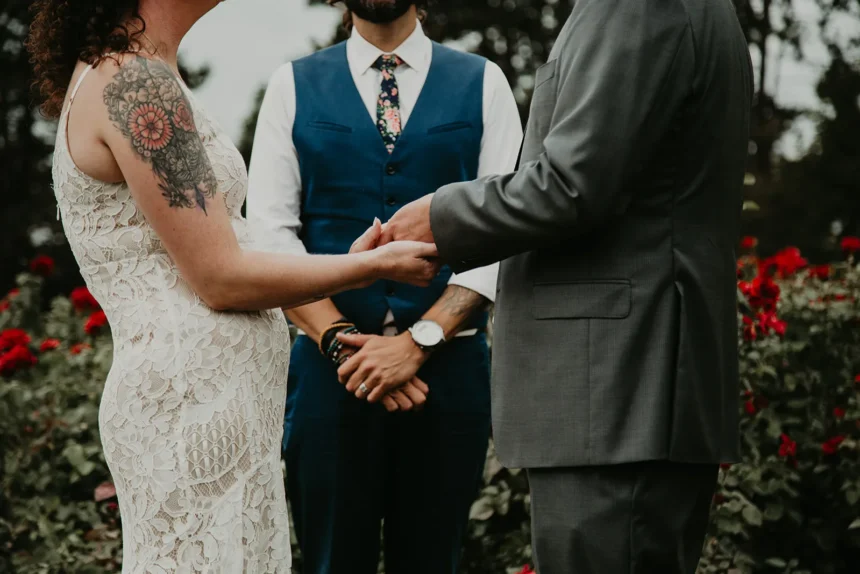When you’re asked to officiate a wedding, your attire plays a significant role in making the ceremony special. Choosing the right wedding officiant outfit reflects the formality of the event, honors the couple’s preferences, and ensures your comfort throughout the ceremony. This guide will help you choose the best attire to wear when officiating a wedding, ensuring you look and feel your best.
Considerations Before Choosing Your Outfit
Before selecting your officiant wedding attire, consider these key factors:
- Type of Wedding: Is the wedding formal or casual? Will it be indoors or outdoors? The formality of the event often dictates the attire. For a formal wedding, you may need a tuxedo or a classic suit, while for a casual wedding, a blazer or a stylish dress could be perfect.
- The Couple’s Preferences: Some couples may have specific guidelines for their wedding officiant attire. Make sure to ask them if they have a particular theme or color scheme that you should align with.
- Venue and Season: If it’s an outdoor wedding, lightweight, breathable fabrics like linen are ideal. For winter weddings, layering and choosing fabrics like wool or velvet may be necessary to stay warm.
- Comfort and Practicality: As an officiant, you’ll be standing for extended periods, so your attire should be comfortable and allow for ease of movement. Choose an outfit that helps you perform your duties while staying at ease.
What to Wear Based on Wedding Type
Your attire as an officiant may vary based on the type of wedding. Here’s what to consider:
- Formal Weddings: For traditional or elegant weddings, a tailored suit, tuxedo for men, or an elegant dress for women works well. These outfits blend in without overshadowing the bride and groom. Keep the style understated and classic.
- Casual Weddings: For a more relaxed atmosphere, opt for a smart blazer, a stylish dress, or a chic jumpsuit. Choose lightweight and breathable fabrics that still look polished.
- Destination Weddings: Officiating a destination wedding often means the attire should be lightweight and comfortable, especially in tropical climates. Think breathable materials like linen or cotton. Comfortable destination wedding officiant outfits work well in warmer settings.
Guidelines for Specific Types of Officiants
Different officiants may have different dress codes:
- Religious Officiants: Religious weddings may require specific garments like robes or vestments. Follow the traditional attire for the ceremony, whether it’s a clerical robe or a more conservative suit, depending on the religion.
- Secular or Non-religious Officiants: For non-religious weddings, you have more flexibility in your wedding officiant attire. A suit, dress, or jumpsuit that maintains formality and respect for the occasion is ideal.
Gender-Neutral Options
For officiants who prefer gender-neutral attire, there are many stylish options available. Whether you’re a man, woman, or non-binary, consider tuxedos, suits, dresses, or jumpsuits. Choose an outfit that feels right for you while maintaining the formality of the occasion.
Colors to Avoid
- Black: While classic, black is often seen as too somber for weddings, especially if it’s not a formal event. Consider alternatives like navy, grey, or charcoal for a formal yet subtle look.
- White: White is reserved for the bride. It’s best to avoid it to ensure you don’t overshadow her on her big day.
- Bright or Neon Colors: These colors can be distracting, especially in wedding photos. Stick to softer, elegant tones like pastels, blushes, and neutrals to keep the focus on the couple.
Accessories to Complete the Look
- Footwear: Choose elegant, comfortable shoes that will allow you to stand for long periods during the ceremony. Heels, flats, or wedges work well—just make sure they’re easy to move in.
- Jewelry: Keep your jewelry minimal and tasteful. A pair of stud earrings, a delicate necklace, or a simple bracelet can add just the right touch without drawing attention away from the couple.
- Outerwear: If it’s a chilly day, consider a stylish shawl, blazer, or cardigan. For colder weddings, a light coat can complement your outfit while keeping you warm.
How to Prepare for the Ceremony
Make sure your officiant wedding attire is well-prepared. Iron or steam it to avoid wrinkles. Try your outfit on ahead of time to ensure it fits comfortably and allows for ease of movement during the ceremony.
FAQ – Frequently Asked Questions
1. Can I wear a black suit as a wedding officiant?
While black is often seen as a classic and formal option, it can sometimes be too somber for weddings. For more formal events, black is acceptable, but for casual or outdoor weddings, opt for navy, grey, or another darker shade for a more balanced look.
2. Do I need to match the wedding party’s attire?
As an officiant, you don’t need to match the wedding party, but it’s important to coordinate with the couple. Ask them if they have a particular color or theme in mind that they’d like you to align with. For example, if the wedding party wears pastels, a neutral or complementary tone might be a good choice.
3. What should I wear if the wedding is outdoors?
For outdoor weddings, lightweight fabrics like linen or cotton are ideal. Make sure to consider the season and the weather. For summer weddings, lighter fabrics help keep you cool, while for winter outdoor weddings, layering with stylish outerwear will keep you warm.
4. Can I wear a jumpsuit to officiate a wedding?
Yes! Jumpsuits are a stylish and comfortable alternative to traditional suits or dresses. For more casual or non-traditional weddings, a chic jumpsuit is a great option. Just make sure it remains formal enough for the occasion.
5. Is there a dress code for religious wedding officiants?
Yes, religious wedding officiants often need to wear specific attire like robes or vestments, depending on the tradition. It’s important to check with the couple or the religious institution to ensure you follow any dress code requirements.
6. How can I personalize my officiant outfit?
Consider adding a personal touch to your outfit, such as a custom boutonniere, a unique piece of jewelry, or a special scarf or shawl. If you’re officiating a wedding for close friends or family, a personalized accessory can help make the outfit feel more meaningful.
Conclusion
Choosing what to wear to officiate a wedding is all about finding the right balance of style, comfort, and respect for the occasion. Whether it’s a formal or casual event, selecting the right wedding officiant outfit will help you feel confident while playing a crucial role in the couple’s big day.






